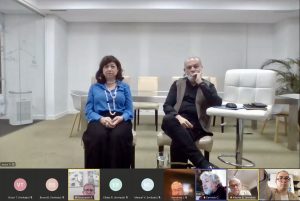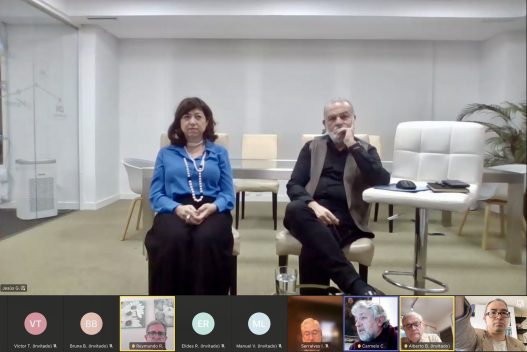
LAWSUIT AGAINST META: 'ADVERTISERS SHOULD NOT ENTRUST THEIR ADVERTISING TO PLATFORMS THAT DO NOT RESPECT CITIZENS' RIGHT TO THE PROTECTION OF THEIR PERSONAL DATA'
Irene Lanzaco, general director of the Spanish Media Association (AMI) has explained the basis of the lawsuit that 83 Spanish media have filed against the technology company Meta, owner of social networks such as Facebook, Instagram and WhatsApp, and from which they are claiming 550 million euros in compensation.
She argues that it would not be necessary to wait for the outcome of the lawsuit to start seeing changes, especially in the sector of advertisers, both public and private, who should not entrust their advertising to platforms that disrespect citizens’ rights.
In the third webinar organized by EditoRed, developed this Wednesday, December 20, 2023 and that you can see in this link with Canal Europa, Lanzaco explained that “the right to the protection of personal data is an indissoluble part of the right to privacy, which is a fundamental right, protected by the Spanish Constitution, which has an inalienable nature”. And that right, AMI argues, has been violated, as will be explained below.
“Public and private advertisers have the obligation to initiate a process of reflection to decide where they want to entrust their advertising,” said Lanzaco. That decision will be observed by society. “We are at a time when society does not accept deviant behavior. Society is asking companies and public agents for correct behavior, respectful of people’s rights. In this environment, it is not reasonable to ignore what has happened in Europe.
And what has happened?
MEDIA REVENUES ARE ERODING
Since the advent of the Internet on mobile devices, technology companies have been able to have all the economic revenues from digital advertising at their disposal, leaving the media with residual revenues. This has led to the reduction of cuts in newsrooms, if not their closure. These cuts are terrible for the journalists who are laid off, but also for the publishing houses that are forced to sacrifice their ability to generate content because they no longer have the economic strength to pay the journalists who create it.
When the Internet burst onto the scene, the media were among the first to embrace this new technology. From the beginning, they uploaded their content to these new platforms. In fact, in Spain, the media are in second place in the ranking of the most digitized economic sectors, behind only the technology companies themselves.
These contents were uploaded with free access, with the intention of accessing wider audiences, and always with the commitment to inform society. It was thought that, with larger audiences, there would be advertisers interested in placing their advertising there and this would give the media economic sustainability in this new technological moment. Things did not work out that way.
POWERFUL TARGETED ADVERTISING
“Something happened that we hadn’t anticipated,” Lanzaco acknowledges. The platforms came with the great technological capacity to analyze the behavior of the audience through the network. “Based on this technology,” he explains, “they have been able to target advertisers to offer them segmented advertising; with this segmentation capacity, which is not available to the media, technology companies are able to offer advertisers audiences that are very close to their advertising interests”.
But is it illegal to sell targeted advertising? “It is not,” clarifies the AMI director. “What we are asking is that the regulations necessary to carry out this sale be respected. And what the European regulations say is that in order to profile users’ personal data – which is what makes targeted advertising possible – it is necessary to have what in law is called a legal basis that legitimizes this activity, and in the case of Meta this legal basis does not exist.”
THE PRECEDENT THAT CHANGES EVERYTHING
There was a significant event that led the 83 Spanish media associated to AMI to file the lawsuit against Meta.
In December 2022 and January 2023, the Irish Data Protection Authority issued three decisions of paramount importance. Ireland is a regulatory haven for digital platforms; in that country, which is part of the European Union, Meta has declared its official domicile in Europe.
On December 31, 2022, the Authority issued rulings against Instagram and Meta. The following month, it issued another one against WhastApp. Together, the three amounted to a fine of 400 million euros. The infringement committed was set out in the European Data Protection Regulation, which had entered into force. Based on it, the Irish authorities determined that the tech company had been selling targeted advertising without the legal basis to enable it to do so.
And Meta only sells targeted advertising. “That allows us to conclude that 100% of its advertising sales have been obtained illegally,” says Irene Lanzaco.
But why are the media claiming compensation in their favor? She explains that “all this means that Meta has obtained a competitive advantage from a regulatory infringement, conduct that is qualified by the Spanish Unfair Competition Law as an infringement that gives rise to a sanctioning conduct and compensation for the damages it has produced in the market for its competitors”.
It asserts that “it is clear that the Spanish media have been affected at the moment in which Meta’s commercial proposal, based on the profiling of advertising that commits a regulatory infringement, has deprived the Spanish media of participating in advertising revenues that, under ordinary conditions, would have served to finance journalistic activity”. This is the basis of the lawsuit.
ADVERTISING MUST RETURN TO THE MEDIA, WHICH BUILDS DEMOCRACY
Without advertising revenues, the media cannot guarantee their sustainability. Therefore, “advertising investment must return to the media, media that build democracy, that build society, that encourage civic coexistence”.
Lanzaco emphasizes that in the media there is conversation and responsibility, a responsibility that occurs in front of the audiences and in front of the courts of each country. “This does not happen in social networks, which feed irresponsibility, confrontation, polarization and are at the source of all the problems that 21st century society is facing,” he says.
In this regard, it will be necessary to keep an eye on another lawsuit that Meta is facing, one filed by 35 U.S. states, which denounce that the company is deliberately designing its products in a way that harms the health of minors. “It is very serious,” considers Lanzaco; “it is known that minors are having access to networks that make it easy for them to lie about their age data (…), minors are being exposed to content that is toxic for them because there is a company that has decided to monetize the data of minors, even under the age of 12. No one can remain indifferent. Public and private actors have the obligation to rethink what is their model of relationship with social networks”.
WHAT HAS META SAID IN RESPONSE TO AMI’S REQUEST?
Nothing yet. The lawsuit has not yet been admitted for processing. The process may take between two and three months in the Spanish courts until the case is heard by a specific judge, after which the company must be notified and summoned to respond.
So far, AMI has not had any conversations with executives of that technology company. The General Director says that in the past she tried to approach them on another matter. On that occasion, she asked the company to explain to Spanish publishers what its negotiating position is with respect to the provisions of the Spanish Intellectual Property Law regarding the recognition of a payment for the right to exploit their content, which the platforms use for their commercial benefit without any economic agreement with the media. On that occasion Meta’s response to AMI’s formal communications was silence, says Lanzaco.
THE EFFECTS IN EUROPE AND LATIN AMERICA
If the Spanish media win the lawsuit, they will receive much-needed financial compensation to ensure their sustainability. They need income to be able to pay their journalists, their network of correspondents, to invest in new digital technologies, to give continuity to their information and to provide service to their citizens.
But, Lanzaco assures that they are looking for a multiplier effect, beyond the Spanish borders. “This lawsuit was filed by 83 Spanish media, certainly, but it is not only of 83 Spanish media, but of the entire collective of the journalistic ecosystem, of people who defend the activity of the media, who seek sustainable models that guarantee the survival of quality journalism, which serves to transmit reliable information to citizens, from which they can adopt, based on knowledge, their civic decisions”.
AMI’s demand has obtained the support of its Spanish colleagues, including radio and television media. European journalistic organizations have also shown their support and interest in the issue, supported also by the regulations that govern the entire European Union, with community institutions that have been active in supporting this type of demands.
For the time being, there have been no approaches from Latin American and Caribbean press organizations interested in similar initiatives. But it is hoped that the development of the case may motivate more institutions to join the legitimate search for fair models of sustainability for a sector that is vital for democracy in any country.
It would be necessary to analyze the legal framework of each country and the behavior of the technological giant in each jurisdiction, but, says Lanzaco, “it is sensible to think that there will be new actors that replicate initiatives of a similar nature. Because it is clear that META (…) has created an empire of colossal economic magnitude on the basis of the appropriation and for its exclusive benefit of citizens’ personal data, and this is a conduct that should have a consequence”.
The president of EditoRed, Jesús González Mateos, affirms that these talks organized by the association of editors he presides, which gathers media from Europe and Latin America, aims at extending the topic to more countries, so that editors and journalists from other latitudes know the situation and recognize possibilities on the way to keep the media afloat.
The Director General of AMI affirms: “We believe that the value of this lawsuit exceeds the Spanish jurisdiction and that it is the common heritage of all the media and journalists of the world”.
This text is free to use. If you use it, please cite EditoRed.



